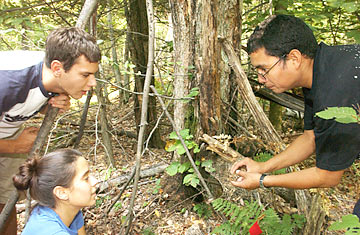Table of Contents
Turn Left in Bismarck, and Go Until…
Relax! We Have New Labs for That
Fieldwork Across the Curriculum:
Update on ISEI
The World of Science
Letter from James Costopoulos '83
The World of Science
From Lake Champlain to Nevada and El Salvador, much recent faculty-student collaborative research has applications far beyond the boundaries of the campus.
Assistant Professor of Biology Carlos R. Ramirez-Sosa (right), studies plants on the Kip Tract, a short walk from campus, with Ashley Arnista '05 and Benjamin J. Frisch '05. By Alexei Boulokhov ’03
From studying rats to saving the planet, St. Lawrence student scientists get to do it all. As esoteric research transforms into practice at a speed and with a magnitude unprecedented in history, the University is endeavoring to stay on the fabled “cutting edge” of both the purely academic and the practical application sides of science. Mindful of its historic philosophy of personal attention to its students, the University remains more committed than ever to supporting independent student research and faculty-student collaborations in all areas of the curriculum, including the sciences.
Sometimes, such projects have an impact far from campus. The computational chemistry research group, led last summer by Assistant Professor of Chemistry Jeffery Greathouse, investigated geochemical interactions relevant to the proposed nuclear waste repository at Yucca Mountain in Nevada. “Our research provides a molecular-level picture of how radioactive substances interact with minerals, if they were to come into contact,” Greathouse explains.
Some academic opportunities take students farther afield. During Summer 2002, Denise Velez ’05, Bronx, N.Y., and Assistant Professor of Biology Carlos Ramirez-Sosa studied plants as indicators of environmental pollution in the jungles of El Salvador. “It was such a beautiful time in my life,” says Velez. “You can read everything there is to read about it, but nothing beats the experience of actually working in the tropical environment, in the real jungle.” She spent four weeks collecting samples in El Salvador and another four weeks back on campus performing chemical analysis.
Interest in preserving water cleanliness led Stephen Drake ’03, Harleysville, Pa., and advisor Ning Gao, assistant professor of chemistry, to base their research for mass balance assessment of mercury in Lake Champlain on a previous senior project by Nathan “Gabe” Armatas ’02. “I was impressed with his work, and getting to build on something a fellow St. Lawrence student did was an awesome experience,” says Drake. The findings will combine with those of others striving to protect what has been called “America’s sixth Great Lake.”
Some research projects bridge the gap between the sciences and other disciplines. Leslie McCabe ’02 completed an honors project in physics that looked at the lives and struggles of women in the sciences. “The Concept of Women's Work in Astronomy: Women at the Harvard College Observatory, 1875 — 1930,” demonstrates one of many ways St. Lawrence students find to celebrate the sciences.
